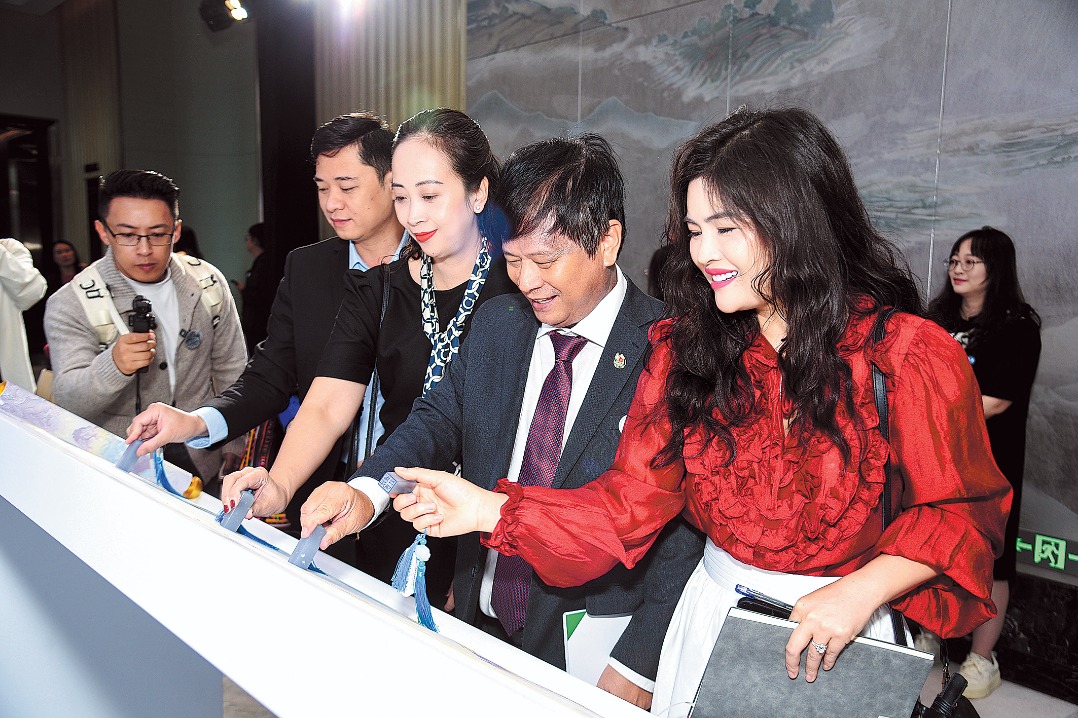Africa 'must not take help for granted'

Continent needs to demonstrate advantages to help convince investors that conditions are ideal
Africa should not take for granted the historic opportunity it has to take on factories that are no longer economical to operate in China due to higher labor costs, says Carlos Lopes, executive secretary of United Nations Economic Commission for Africa.
African nations should draft an industrial policy and make their competitive advantages clear in order to be prepared to receive industrial transfers, so that industry doesn't go elsewhere, Lopes says.
| Carlos Lopes says African nations should draft an industrial policy and make their competitive advantages clear. Xu Jia / China Daily |
Lopes, interviewed at the New York Forum Africa in Libreville at the end of August, also says Africa has benefited greatly from China's "long-term vision" in helping develop infrastructure. But expectations are high that China will contribute even more to the continent's integration by supporting regional infrastructure projects.
China, with a fast-growing middle class, is changing from a mostly production-based to a more consumption-based economy. China's wages have grown to the extent that it can no longer support labor-intensive, low-value production, he says.
"What will happen is not very different from what the European economy or other regions experienced before. They went first into labor-intensive production and they moved up the ladder until they controlled the value chain, mostly through software and sophisticated parts, which involve design, innovation and technology.
"So China is going the same way. When it goes, it will need a partner that takes care of the lower, labor-intensive dimensions.
"So here you can see there is a convergence of interests. It's in China's interest to export it elsewhere and it is in the interest of Africa, because this type of industry creates a lot of jobs. So for Africa, it's fantastic as a starting point for its industrialization," Lopes says.
However, that does not mean low-value chain production will automatically go to Africa, he says.
"Africans should have very good reasons for attracting this type of industry, (and they) shouldn't take for granted that China will come to industrialize the continent if Africans don't do the homework of preparing for it.
"It's easier for Chinese investors to go to Vietnam, to go to the neighborhood not far away, even to Bangladesh and so forth, rather than Africa."
African countries first should make clear what their competitive advantages are, Lopes says. The competitive advantage could be raw materials, like leather for shoes and cotton for textiles, a well-trained labor force, good market conditions or good infrastructure.
"Why should they come to an African country if no competitive advantage is there?" he says of Chinese investors. "It's Africans who have to pull this together."
African countries need to have an industry policy, including a strategy for industrialization, so that different dimensions such as trade, education, the internal market and infrastructure can develop in sync with it. Currently, 22 African countries are drafting their industry policies, Lopes says.
The complexity of today's industrial chains also means African countries must "position themselves in the value chain" correctly, he says.
"Production of any industry or manufacturing of goods today is not like in the past, when everything was done in the same place. Now you may have the invention in San Francisco, the design in Italy and part of the production done in one factory here, another one in that factory there. The package comes from another place. So value chains are very complex today," Lopes says.
"In studying the value chain, you have to insert yourself into the right spot, where you can make a difference."
There are three priorities for Africa's industrialization: commodity-based industry, agricultural processing and labor-intensive industry, he says.
While many products are exported from Africa as raw materials, commodity-based industrialization aims to add more value to every commodity. For example, while some African countries lack the capacity to export chocolate, they could try to export cocoa paste instead of raw cocoa beans, he says.
"Now Africa still imports a great percentage of the food it consumes" to meet the needs of its growing middle class, even though "every condition is there in Africa for production". This is because agriculture "doesn't link up with the industrialization" and "the transformation is not taking place right now", he says.
The fragmented market posed by the continent's 54 countries can make industrialization challenging, triggering a great need for integration. While many African countries have been making the effort to integrate, the lack of regional infrastructure has been a great hindrance.
"There is not a single president in Africa who will not say, 'I want a pan-Africa and I want integration of Africa.' But it's stuck in the details," he says. "The No. 1 problem for integration is infrastructure."
In June, the Common Market for Eastern and Southern Africa, the Southern African Development Community and the East African Community signed an integration agreement, and free trade area negotiations also began, Lopes says.
But while policies may be aligned, "you still need integration also to help from an infrastructure point of view", he says.
"There was a bias against infrastructure among the traditional partners of Africa. Like for a long time, the World Bank did not like to invest in infrastructure. All the international financial institutions were very scared of infrastructure and were not investing in infrastructure."
China, however, has invested a lot in infrastructure in Africa. "I think Africa is benefiting a lot from China, in the last two decades in particular," he says, because of its long-term vision. "When you have a long-term vision, your perception of risk is different", and "you also look into opportunities that are going to arise", which is what investment in infrastructure requires.
While China has been involved in some regional infrastructure projects, he says, he expects China to contribute more to such projects to facilitate Africa's integration.
"If China finances regional infrastructure projects, it can be very different from funding or helping country per country for infrastructure."
The railway built by the Chinese linking Djibouti and Ethiopia - a landlocked country with the second largest population in the continent -has been very significant, Lopes says.
"It's just one investment in a railway, but it completely integrates the two countries economically. You call them Ethiopia and Djibouti, but it's like the same country. It creates dynamics."
"The first infrastructure that was funded by China in the 1960s was a railway between Tanzania and Zambia. The principle is right. The principle is regional integration."
houliqiang@chinadaily.com.cn
(China Daily European Weekly 09/25/2015 page32)
Today's Top News
- China plays a vital role in SCO's green transition
- Beijing warns Manila of 'all consequences'
- World needs right WWII narrative
- Military parade not a demonstration of bloc confrontation
- New 1st-tier cities gain ground in talent battle
- Global cooperation in AI highlighted































